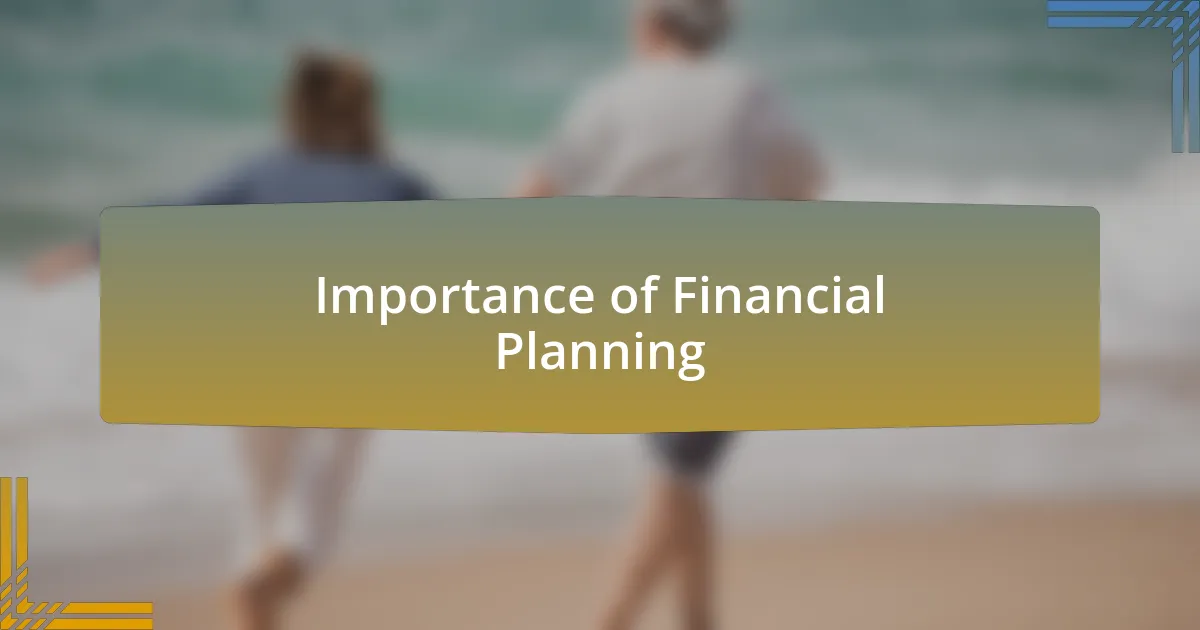Key takeaways:
- Luxury retirement homes focus on community, comfort, and personalized services, enhancing residents’ quality of life.
- Proactive financial planning is essential to manage unexpected costs, allowing for a secure and fulfilling retirement.
- Building an emergency savings fund and budgeting effectively are critical strategies for financial stability and preparedness.
- Adaptability in financial planning enables better handling of unforeseen expenses and fosters a more empowered approach to managing finances.

Understanding Luxury Retirement Homes
Luxury retirement homes are designed to offer more than just a place to live; they provide an elevated lifestyle that caters to comfort, security, and social engagement. I remember visiting a beautiful facility where the vibrant atmosphere immediately made me feel at home. Can you imagine sipping coffee in a lush garden, surrounded by friends, while participating in engaging activities that stimulate both the mind and spirit?
These communities often showcase amenities that rival high-end resorts, from gourmet dining options to personal fitness centers. The time I spent in one of these homes opened my eyes to the level of detail that goes into creating a nurturing environment; it wasn’t merely about luxurious furnishings, but rather about fostering a sense of belonging and well-being among residents. Have you ever thought about how crucial community interaction is as we age?
Additionally, luxury retirement homes usually provide tailored services to meet individual needs, ensuring that personal health and comfort are prioritized. I spoke with a resident who shared how staff members remembered her preferences, making her feel truly valued. Isn’t it heartwarming to think that one can enjoy a fulfilling life tailored specifically to them in their golden years?

Importance of Financial Planning
Financial planning is crucial for navigating the unexpected costs that can arise during retirement. When I first faced a sudden medical expense, I realized that budgeting for such contingencies was not just prudent, but necessary. Have you ever considered how easily life can throw us a curveball? Having a solid financial plan in place provides peace of mind and reduces anxiety about what might come next.
Creating a financial cushion allows for more freedom and enjoyment in life. For instance, I once had to replace a broken appliance in my home, and it was a relief knowing I had savings set aside specifically for such unforeseen events. This experience taught me that proactive financial management means I can prioritize my lifestyle choices without worrying about smaller setbacks. Isn’t it reassuring to know that a bit of planning today can unlock greater possibilities tomorrow?
Thinking ahead also enables us to embrace our retirement dreams without hesitation. I vividly remember a friend who had meticulously planned her finances; when the opportunity to travel abroad arose, she didn’t hesitate to say yes. Instead of worrying about expenses, she could fully immerse herself in the experience. How amazing would it feel to grasp such moments of joy without financial stress lingering in the background?

Identifying Potential Unexpected Expenses
Identifying potential unexpected expenses requires us to take a close look at various aspects of our daily lives. For example, I once encountered an unexpected property tax increase. This caught me off guard, and it made me realize how essential it is to stay updated on local regulations and potential changes in bills. Have you thought about how local policies might affect your finances?
Another area to consider is health-related costs, which can vary dramatically. When I faced a sudden dental emergency, the expense was hefty and entirely unplanned. This experience highlighted the need to account for medical issues beyond routine visits. How often do we overlook these potential health-related surprises?
Finally, examining personal interests and hobbies can reveal unforeseen costs as well. I remember planning a long-awaited golf trip, only to discover hidden fees that significantly impacted my budget. This taught me to dig deeper when anticipating costs. Are we really preparing for all aspects of the experiences we cherish?

Strategies for Emergency Savings
Building a robust emergency savings plan starts with setting a realistic goal. From my experience, I found that assessing monthly expenses can help determine how much to save. I made it a point to save a small percentage of my income each month, which created a safety net over time. Have you considered what percentage of your income could comfortably go toward that safety net?
Utilizing a separate savings account is another useful strategy. Personally, I opened an account specifically for emergencies and labeled it distinctly. This simple act prevented me from tapping into those funds for everyday spending. How can you keep your emergency savings distinct from your regular finances?
I also recommend automating those savings. Each month, my bank automatically transfers a set amount into my emergency account right after my paycheck arrives. This approach removed the temptation to skip saving when other expenses popped up. How can you set up a similar system to ensure your emergency fund grows without extra effort on your part?

Tips for Creating a Budget
Creating a budget can feel daunting, but breaking it down into manageable steps makes it achievable. When I first started budgeting, I took a hard look at my monthly expenses. I categorized them into essentials, like housing and groceries, and non-essentials, like dining out and hobbies. This clarity helped me understand where I could cut back, which was both liberating and eye-opening. What categories could you explore to see where you stand?
I also believe in the power of setting specific, achievable goals. For example, when I was saving for a trip, I created a separate line in my budget just for that purpose. It made the process feel more rewarding to watch that fund grow with every contribution. Are there experiences you’re saving for that could inspire your budgeting efforts?
Lastly, regularly reviewing and adjusting your budget is crucial. I make it a monthly ritual to check my progress and see if my spending aligns with my goals. Sometimes, unexpected expenses pop up, and I adjust my allocations accordingly. How often do you revisit your budget to make sure it’s still serving your needs?

Personal Experience with Cost Management
When I faced an unexpected medical expense, it really put my cost management skills to the test. I had to dig deep and prioritize my spending, which made me acutely aware of what was truly important. Sometimes, that kind of shock can become a learning opportunity—have you ever found yourself reevaluating your priorities during a financial crunch?
One memorable incident involved my car needing substantial repairs right after I thought I had my finances under control. I had to scramble to find room in my budget without compromising other areas of my life. In that moment, I felt the stress weigh heavily on me, yet it forced me to tap into my creativity, seeking side hustles to cover the additional costs. Have you ever had to think outside the box to handle financial surprises?
I’ve realized that keeping an emergency fund is essential for peace of mind. A few months ago, I committed to setting aside a little each month just for those surprise expenses. Consequently, when an unexpected bill arrived last week, I was relieved instead of anxious. How does the idea of a safety net make you feel about your financial future?

Lessons Learned for Future Planning
One key lesson I learned is the importance of proactive budgeting. After the unexpected car repairs, I decided to create a more detailed monthly budget that includes specific allocations for unforeseen expenses. This simple step transformed my financial landscape, turning anxiety into empowerment. Have you ever taken a moment to reconsider how your budget might better serve your future?
In another instance, I found myself facing a home maintenance issue that I had underestimated. Realizing I should have prepared for upkeep costs led me to research and connect with local service providers in advance. This not only eased the burden when the expenses emerged but also reminded me of the value of staying informed. How often do we neglect to gather information that could save us stress later on?
Lastly, I learned the power of adaptability. When unexpected expenses arose, I had to evaluate my priorities quickly. This experience taught me to embrace flexibility in my plans, allowing for a more dynamic approach to financial management. It’s a balancing act—how might embracing adaptability change the way you view financial planning?